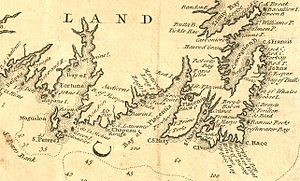Raid on Newfoundland
| Newfoundland expedition | |||||||
|---|---|---|---|---|---|---|---|
| Part of Queen Anne's War | |||||||
 Extract of a 1744 map showing southeastern Newfoundland |
|||||||
|
|||||||
| Belligerents | |||||||
|
|
|
||||||
| Commanders and leaders | |||||||
|
Sébastien Le Gouès, Sieur de Sourdeval Philippe Pastour de Costebelle |
John Leake | ||||||
| Strength | |||||||
| Several Coastal Batteries, 51 warships and fishing vessels, unknown number of French colonists and militia | 6 English Men of War, unknown number of naval troops | ||||||
The Newfoundland expedition was a naval raiding expedition led by English Captain John Leake between August and October 1702 that targeted French colonial settlements on the North Atlantic island of Newfoundland and its satellite Saint Pierre. The expedition occurred in the early days of Queen Anne's War, as the North American theater of the War of the Spanish Succession is sometimes known.
Leake's fleet descended on French settlements on the southern shore of Newfoundland, destroying fishing stages and other infrastructure. They captured fishing and trade ships, and destroyed most of the settlement at Saint Pierre. In a final flurry of activity before returning to England, Leake captured several ships from the French merchant convoy as it headed for Europe. More than 50 ships were taken in total, and six seasonal settlements were destroyed. The strongly fortified French base at Plaisance was not attacked.
Hostilities in the War of the Spanish Succession had begun in 1701, but England did not get involved until 1702, planning a major naval expedition against targets in Spain. On 9 June 1702 (Old Style)Newfoundland also became a target when George Churchill, chief advisor to the Lord High Admiral, Prince George, informed Captain John Leake, "I have proposed to the Prince, your going to command a squadron to Newfoundland; you will be a Chief of Squadron". Leake's commission, issued on 24 June, came with instructions to investigate the military strength of the French in Newfoundland, and to "annoy them there in their fishing harbours and at sea". He was also to convoy merchant ships in both directions, report on the conditions of the English settlements and fisheries, and act as governor of the territory while he was there. To accomplish this he was given command of HMS Exeter and a small fleet of ships. On 22 July 1702, he departed from Plymouth with a fleet of nine ships, including six ships of the line. His ships included (in addition to Exeter) the fourth rates HMS Assistance, HMS Montagu, HMS Lichfield, HMS Medway, and HMS Reserve.
...
Wikipedia
